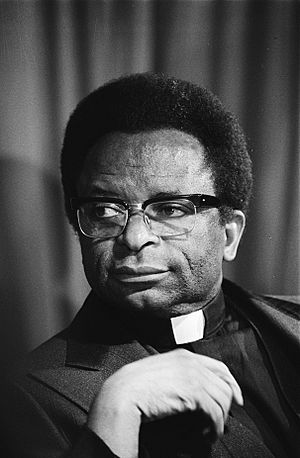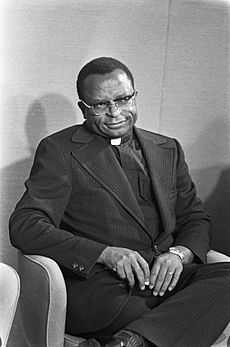Abel Muzorewa facts for kids
Quick facts for kids
Abel Muzorewa
|
|
|---|---|

Muzorewa in 1977
|
|
| Prime Minister of Zimbabwe Rhodesia | |
| In office 1 June 1979 – 18 April 1980 |
|
| President | Josiah Zion Gumede |
| Preceded by | Ian Smith (of Rhodesia) |
| Succeeded by | Robert Mugabe (of Zimbabwe) |
| Personal details | |
| Born |
Abel Tendekayi Muzorewa
14 April 1925 Umtali, Manicaland, Southern Rhodesia (now Zimbabwe) |
| Died | 8 April 2010 (aged 84) Borrowdale, Harare, Zimbabwe |
| Political party | United African National Council |
| Spouse | Maggie Muzorewa |
| Profession | Clergy |
Abel Tendekayi Muzorewa (born April 14, 1925 – died April 8, 2010) was a Zimbabwean bishop and politician. People often called him Bishop Muzorewa. He was the first and only Prime Minister of Zimbabwe Rhodesia in 1979. He was a leader of the United Methodist Church and a nationalist. He held his political office for only a few months.
Contents
Early Life and Becoming a Bishop
Abel Muzorewa was the oldest of eight children. His father was a lay preacher. Abel went to the United Methodist School near Mutare.
He worked as a school teacher from 1943 to 1947. Then he became a full-time lay preacher. He studied to become a minister from 1949 to 1952. He was officially made a minister in 1953.
Muzorewa later studied in the United States. He went to Central College in Missouri. He also studied at Scarritt College in Tennessee. He earned a Master of Arts degree.
In 1968, he became the United Methodist Church's Bishop of Rhodesia. This was a very important role.
Political Career
Forming the United African National Council
In 1971, the British government tried to make a deal with Ian Smith. This deal would allow more Black people to have a say in the government. It would also end punishments against the government.
Bishop Muzorewa and another church leader, Reverend Canaan Banana, formed a group called the United African National Council (UANC). They wanted to stop this deal. They believed that Black people should have full control before independence.
Their efforts worked, and the proposed deal was stopped. This made Muzorewa a well-known leader. Other Black political groups, like ZANU and ZAPU, joined under the UANC. The UANC was the only legal Black political party because it did not use violence.
The Internal Settlement Agreement
On March 3, 1978, Muzorewa and other leaders signed an agreement. This agreement created a temporary government. This government included Muzorewa, Ian Smith, and others.
They wrote a new set of rules for the country. These rules set aside some seats in the government for the white minority. In January 1979, people voted on these new rules. Most people voted yes.
After this, elections were held. Muzorewa's UANC party won the elections. Josiah Zion Gumede became the first President. Muzorewa became the Prime Minister. The country's name changed to Zimbabwe Rhodesia.
However, the war continued. Robert Mugabe and Joshua Nkomo did not agree with this settlement. The United Nations also said the agreement was "illegal and unacceptable."
The Lancaster House Agreement
The British government called for a meeting in London. All the different groups came together to find a way to end the war. This meeting was called the Lancaster House Conference. It lasted from September to December 1979.
Bishop Muzorewa agreed to new elections. These elections would happen in early 1980. His government then gave up its power on December 11, 1979. The country became a British colony again for a short time. This was a step towards full independence.
New elections took place in February 1980. Robert Mugabe's ZANU party won most of the votes. Muzorewa's UANC party won only three seats. On March 4, 1980, Mugabe became the new leader. The country's name changed to Zimbabwe.
Later Political Activities
In 1983, Muzorewa visited Israel. He suggested that Zimbabwe should have closer ties with Israel. On November 1, he was arrested. He was accused of working against Mugabe's government. He went on a hunger strike for several days.
Muzorewa ran for president against Mugabe in 1996. However, he pulled out of the race. He felt the election rules were unfair. Even so, his name stayed on the ballot, and he received some votes.
In 2007, people asked him to run for president again. He said Zimbabwe was "bleeding" and suffering. He asked people to pray for the country. But he did not run in the 2008 election.
Death and Burial
Bishop Muzorewa passed away on April 8, 2010, at his home in Harare. He was 84 years old and had cancer. People remembered him for his role in Zimbabwe's journey to independence. He was also known for his work with the Methodist Church and for helping to start Africa University.
Bishop Muzorewa and his wife are buried at the Old Mutare Mission Station.
See also
 In Spanish: Abel Muzorewa para niños
In Spanish: Abel Muzorewa para niños
- List of bishops of the United Methodist Church
- Security Force Auxiliaries
 | Jewel Prestage |
 | Ella Baker |
 | Fannie Lou Hamer |


